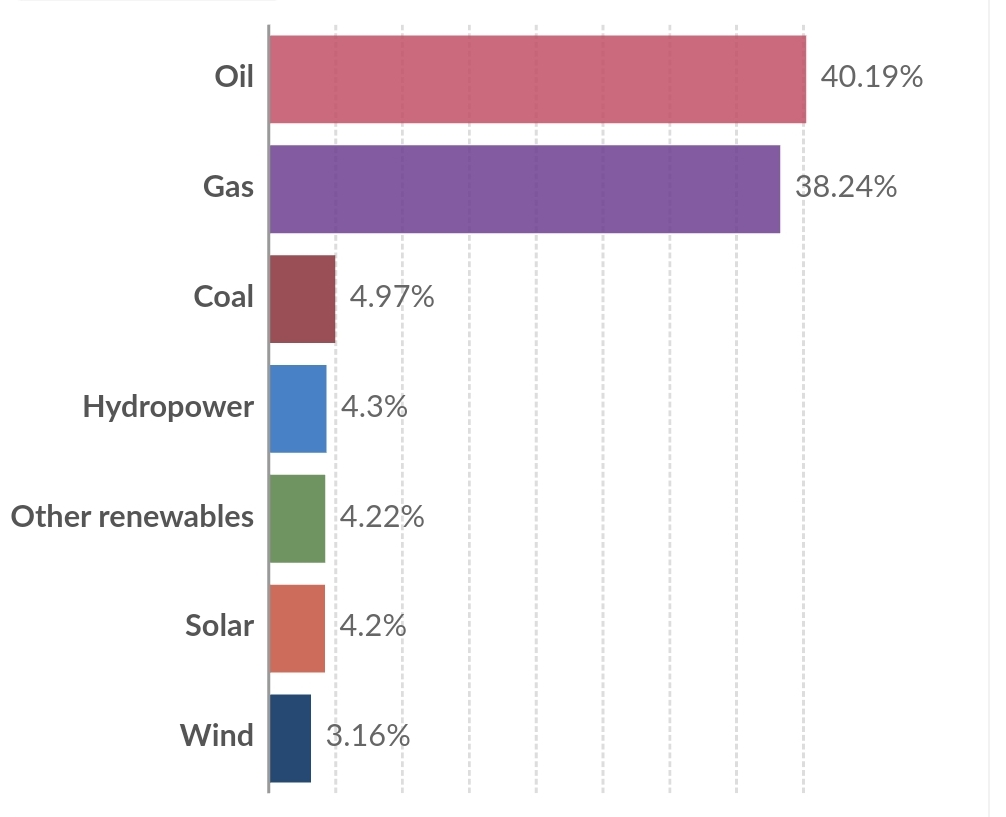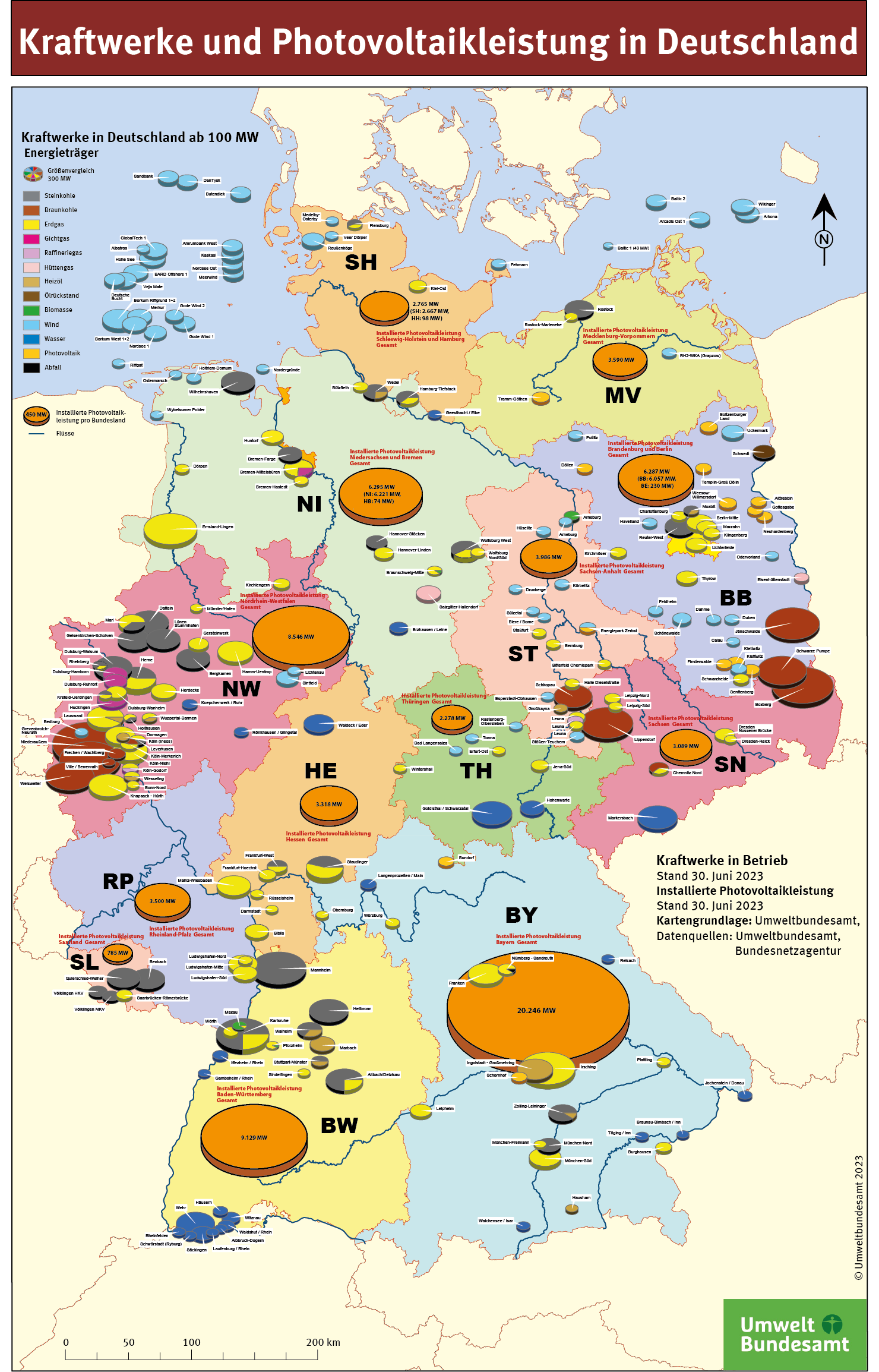Meanwhile in Germany:

You are aware that this is over 5 years old data (2017!) for the German electricity mix, right?
Please don’t get me wrong, the scale up of renewable energy sources is certainly not going fast enough in Germany (thanks to our conservative government that ruled the country for 16 years until 2021!), but please argue this position using the real data for 2023 (57.7% renewables in the German electricity mix)!

You’re right, I’m sorry. I chose the picture because it was the first okay one I found in English. I’ll change it right away.
Good for providing up to date data.
But damn, Germany could have been 65% fossil free if they hadn’t closed the nuclear plants prematurely.
Such a waste of carbon budget.
Anyway, you’re probably going to have a conservative government again after this one. Hope you don’t become the big laggards.
Noooooooo… The decision to get out of nuclear was made over ten years ago. It is done. The last three nuclear plants that shut down this and last year were not serviced, not licensed, had no fuel and no newly trained operators. Stop reviving this debate. What is the real crime here is that the conservative government did next to nothing to push renewables as an alternative. They were bought/lulled by cheap russian gas. Even now, conservative governments in the south and the east of the country refuse to build up renewable energy production for purely ideological reasons. Even if those decisions hurt their own economy.
Sorry I still don’t get it: why not reviving this debate? It’s never too late to kick-off construction of new nuclear plants.
do you know how long it takes until a nuclear powerplant is planned and built?
Until then renewables are 20x cheaper then nuclear power.
the debate has gone one or the other way for years. the people don’t want nuclear power, only our conservative, corrupt parties want it and try to push it every few years; thankfully without any luck.
I know perfectly well that we’re talking about decades of planning, yeah. I still believe every country will need a mix of different energy sources on top of renewables. I think Germany is very short-sighted there.
Well then your thinking is very bad.
Constructing new ones take waaaaaaaaaaay too long and is much more expensive than building equally power capable regenerative energy plants in a fraction of that time.
Germans and their anti-nuclear cult have convinced themselves of a lot of falsehoods. It’s impossible to argue.
Germany is a small country (compared to the USA or China), which means they can easily trade with their neighbors. So, they will just overbuild renewables and trade for nuclear electricity with their neighbors, including us (Netherlands), but mostly Poland and France, which will build the most nuclear plants in the EU.
That’s the plan we compromised in the EU.
They pretend to be nuclear free and we go along with their delusion.
Even France is getting rid of nuclear, they are by far not building enough replacements and their share of nuclear went down too, quite drastically and actually more than Germany ^^
And the nuclear plants on a relevant level are a very big question in Poland too.
We’re not getting rid of nuclear, our objectif is to build a balanced mix of energy sources. Nuclear energy will remain the primary source of energy for decades, no reason to change. But that doesn’t mean that we shouldn’t increase the share of renewables in parallel.
You mean supplement the lack of power when the French nuclear plants are having and causing river trouble again, right?
And here’s a good explanation of something many people seem to find confusing: https://www.renewable-ei.org/en/activities/column/20180302.html
The decision to get out of nuclear was made over ten years ago.
Nope, at least over 20, in 2000. Quick overview:
- Starting approximately with the 68 movement anti-nuclear sentiment began to become common, also tied up with opposition to stationing of nuclear warheads, the general peace movement, etc. Every single new nuclear plant was protested heavily, as such
- By the 90s, it was clear that no new plants would be built: It was political suicide.
- That then was made law in 2000, alongside with giving all existing reactors expiry dates, based on age and security record
- Then a Merkel came along and gave extensions to the remaining reactors. She didn’t touch the ban on new construction.
- Then Fukushima happened and she took back that extension.
- Then Ukraine happened and the three last remaining reactors got a 4 1/2 month extension to help tiding over the whole no gas from Russia situation: Originally (as planned in 2000) they should have shut down on the 31st of December last year, they actually shut down 15th of April this year. Some politicians wanted more but the operators themselves were opposed as they were already winding down the plants, would have to do another round of maintenance and inspections, procure more fuel etc. It was an “either at least five more years or forget it” type of attitude.
If the approval process continues as it currently does and solar installations do not slow down massivly, by the end of the term the approved renewbales projects should bring Gemany above 80% renewables. Practically speaking that would be the coal exit done. Maybe not fully, but they would not matter much.
As for the rest, the current plan for hydrogen power plants is currently being negotiated with the EU. The good news it looks like a deal has been reached and if the plans shown by the current government are implemented, that would basicly mean a full coal exit and the starategic storage question being answered.
Basicly the current German government has passed laws for an estimated 64% redcution of emissions by 2030 compared to 1990. The current target is 65%. So with a bit of luck it will work out.
Yes, I see the advantage of CO2 neutrality, but:
The amount of active Nuclear repository sites for spent nuclear fuel and high level waste is… underwhelming.
https://en.m.wikipedia.org/wiki/Deep_geological_repository
60 years time to find a suitable hole to drop the waste into and very limited success so far. Nobody wants it in the own backyard (even if it would be suited.).
The other end of the chain (mining and enrichment) doesn’t look like an environmental success story either, or does it? Poisoned groundwater looks like an issue to me… also if it happens in Canada or Kazakhstan.
The dots in between… One meltdown around every 20 years (worldwide) ? - the area here is just too densely populated to risk one here. They started to dismantle the first plant in Germany in 89 - still not done.
Edit: in my eyes the cons (I just named a few of them) outweigh the advantages. I mean the co2- neutrality is a big plus, but is it enough to justify the risks and damages? Aren’t there better alternatives? Am I wrong? Please bring facts.
Edit again: thinking further, for me the question to answer is not, either add more CO2 to the atmosphere or have (more) nuclear fission plants. It is the question, how to remove fossils from the energy mix without having to use nuclear fission. With the one extreme to only use what you have and its many backdraws.
Germany could be 84% fossil free if they didn’t have to
run their neighbors electricity gridssubsidize their neighbors.
Not true. One big problem in Germany is that the grid can’t handle all the electricity generated by renewables so they often shut them down. Something you can’t do with nuclear l. Since nuclear got of the grid it got more capacity for renewables hence the share jumped this year.
That’s not how that works, mate. Nuclear is the highest priority of energy generation because it’s ultra cheap to produce and completely stable (once you have the reactors built, that is). If Germany still had those power plants, they could’ve dumped fossil and kept renewables, all while investing in energy storage.
Except that if you calculate the complete cost including building the plants it’s stupendously expensive compared to renewables even including energy storage.
Which is irrelevant, unless you’re representing a profit-seeking corporation (if that were the case, fuck off, then).
I do like nuclear, but of course the costs matter regardless of profit seeking. If you have two options that are same benefit but one costs more, to go with that one is just wasteful.
They’re not the same benefit. The cost of extracting the materials for building renewable infrastructure is also immense, and that infrastructure must be completely swapped out every couple decades.
Why is that irrelevant? These plants don’t run forever and are very expensive. You wouldn’t buy a car either that costs 15 million Euro, but in return just uses 1liter of diesel per 100km.
These plants don’t run forever
Compared to solar and wind, they may as well last forever. We’re talking the difference between a century or more (nuclear) to complete exhaustion in just a couple decades (solar).
You wouldn’t buy a car either that costs[…]
I wouldn’t buy a car, period.
Nuclear costs double per kilowatt than solar tho??
And Nuclear Plants are always built by for profit companies?Could you cite your source?
Nuclear is the highest priority of energy generation because it’s ultra cheap to produce and completely stable
Not how the laws work in Germany: Renewables always have priority, they get to sell their production first, everyone else has to make do with the rest of the demand.
Renewables always have priority, they get to sell their production first
Well, duh - intermittent generation means it makes the most sense to use while you can and wait on scalable power for when your load demands more power than is available. What I meant by that is that, of all scalable sources, you always go for Nuclear first.
You can shut down or scale back energy/electricity produced from nuclear power plants as well by controlling the reaction rate. What would have been ideal was if nuclear had remained and the renewables took the production capacity share from fossil fuels
The German nuclear plants needed maintenance and refurbishment. Makes sense to invest an other billion to run it for 2 more years.
The renewable energy share skyrocketed since the nuclear shutdown
our conservative government that ruled the country for 16 years
and the next 16 years, if everything works well Ü
!please kill me!<
The past 16 years have been conservative. The next 16 are for the far-right populists. There’s a difference.
Hence the formulation “if everything works well”
And please don’t forget that Germany exports 26.3% of its electricity, while France imports 16.4% of it.

So, Germany could cut 26.3% of its fossil fuel generation and go up to 84% renewables if countries like France wouldn’t depend on it that much.
This year is an anomaly because nuclear production was low because some power plants had to shut down for maintenance. Germany typically imports power from France.
Germany typically imports power from France.
2017 called, it wants to ask when anomalies become the normal.

I have found this nice article (in French) :
https://fr.linkedin.com/pulse/exportations-délectricité-françaises-en-allemagne-finir-steven-lorantIt’s … more complex than one picture.
The average idea is that :
- if you consider physical exchange directly between France and Germany, on the average, France massively exports to Germany.
- but most of the electricity shared between Germany and France goes through Swiss. Swiss has dams to store energy. Germany has many surplus of production with renewables. Swiss is used for transit. As a result, Germany is a net exportator of electricity to France.
Why do you use this tone?
I love how we literally can’t do shit for ourselves here in Italy
You keep repeating this point but renewable energy HAS to be exported when production is over the grid absorption rate. And coal plants have to be on continuously to guarantee baseload due to you moronic energy policies. You can’t bring up a (cherripicked for a single extraordinary year) graph you don’t understand and think it’s a gotcha. Not even mentioning the fact that France exports its energy too.
you moronic energy policies
baseload
Just found one of the morons responsible for that policy.
This is for sure fantastic, don’t get me wrong, but Europe has also exported some of its most polluting industries abroad. And then we also wag our finger at places like China and India.
China and India are great with solar: https://ourworldindata.org/grapher/installed-solar-pv-capacity
Current government in India is heavily pushing for solar energy.
Incredibly based
but Europe has also exported some of its most polluting industries abroad.
Don’t even need to go that far. The french have outsourced their fossil-based electricity industry to Germany.

I don’t know how much of french electricity is actually fossil-free, but when someone says “68% nuclear in the mix” they should maybe mention the 16.4% foreign electricity in their mix, as well.

Guess where all that Italian import comes from. Really, it’s clear you have very superficial understanding and very strong opinions. Typical for germans tbh
deleted by creator
You know France is the largest exporter of electricity right?
It’s not because you’ve picked one period to prove your point that it’s the truth over a longer period. And France has been a net exporter to Germany for much longer than the opposite.
And France has been a net exporter to Germany
Not for the last 6 years, at least. And I’m pretty sure those 13 TWh didn’t just randomly appear in 2017, you usually don’t abruptly go from exporter to importer.
https://www.rfi.fr/en/france/20230112-france-exports-electricity-to-its-european-neighbours-again
With nuclear production low, France has been a net importer of electricity for almost the whole year (except February, May and from the end of December), something that has not happened in 42 years.
France has almost always been net exporter, don’t change the facts please.
The EU’s consumption based emissions per capita have also fallen.

Meanwhile Germany could cut more than 13% of its fossil electricity sources if it didn’t have to export electricity to “97% fossel-free” France. Overall, Germany exports 26.3% of its electricity.

So it could go straight to 84% renewables if other countries weren’t dependent on its electricity.
We have a deep-seated problem with corruption. Most politicians are just cockpuppets of the economy, and fossil fuel corporations have plenty of politicians stuck on their cocks. We were the forerunners of green energy, now we’re just cum-soaked whores.
Least horny upset german.
France usually exports electricity, this year is an abnormality.
And last year was an anomaly as well? Next year, the French nuclear plants will be repaired and their rivers will carry sufficient amounts of water again?
Yes, exactly. It’s in the management PowerPoint for next year, so don’t worry about it
Germany typically imports power from France.
2017 called, it wants to ask when anomalies become the normal.

I mean, isn’t that the core of the intermitancy argument for fossil fuels? Consumers wouldn’t be willing to accept a 100% renewable grid which only met demand 95% of the time.
Perfect is the enemy of good. I’d rather have a 95% renewable grid than not even try. We can at the very least minimize fossil fuel use. It’s kinda silly to be doubling down on it in this day and age.
if you give up on solving that issue with anything other than fossil fuels, yes
100% renewable requires opportunistic consumption, which is hard to do without eating people.
Most of internet infrastructure is base load. It has to work 100% of time.
Wtf is going on in Italy?
We’re lazy fucks.
if it didn’t have to export electricity to “97% fossel-free” France.
I mean, it doesn’t HAVE to, does it? Presumably it’s a voluntary trade?
Edit: Lol. Just like Reddit, get downvoted for asking a neutral question.
Presumably it’s a voluntary trade?
Well, I’d think so, too, but I’m not sure France voluntarily shuts off their nuclear reactors during the summer.
Sssshhhh, don’t interrupt the nuclear circlejerk.
Don’t tell them that nuclear is by far the most expensive source of electricity in europe, no matter which costs you include

while still producing an order of magnitude more CO2 than renewables

or their heads will explode. And don’t ever ask them why no energy company in the world build a new nuclear reactor without subsidies, because the answer is: nuclear power is so ridiculously expensive that it isn’t financially profitable.
Well, that is unless you let the taxpayers cover all the costs, then it’s perfect to reap the highest profits.
Its interesting they use “most recent generation of turbines” but don’t do that on nuclear. Also WISE is not a credible source. It’s an anti-nuclear organisation with guys like Mycle Schneider on board.
Which source says 117g/kWh for nuclear? IPCC 2014 says 12g, UNECE 2020 about 5.1g (for EU28 nuclear).
Its interesting they use “most recent generation of turbines” but don’t do that on nuclear.
Feel free to tell us how much cheaper current nuclear power plants are than the ones that were built in the 70s and 80s.
I’m sure there’s some great data from Flamanville, Olkiluoto or Hinkley Point, showing us all how cheap and affordable nuclear has become.
If you thought just a little bit about what I wrote, you would know I was discussing the second graph.
Answer my points, not reinterpret them to fit your agenda.
“Consequential cost to health and environnement” of nuclear if higher that coal ? Wtf, in what world ?
Coal is more radioactive than nuclear plant, and that’s the lesser issue, between air polution, plant burning, and the effect of that much co2 being released, that can’t be true.
Either it’s bullshit or I missunderstood the graph.
They shutdown half of their reactors temporarily for maintenance in 2022. It was a one time thing. Your statement makes it seem like they do it every year.
The united EU energy market means that essentially, yes they have to.
Maybe voluntary is the wrong word, but do they not get paid for the exports?
Electricity don’t know about capitalism, it has its own laws.
My electricity provider shuts off my power if I don’t pay, obviously physical laws of electricity allow at least that much.
deleted by creator
deleted by creator
Exporting? Electricity doesn’t know about economics, it has its own laws.
France also had to close a nuclear plant because of germany, it was close to the frontier so created political tensions with germany.
But France also have a strong anti nuclear lobby, so it’s hard to build more nuclear sadly.
Damn all these German tears in the comments could be used for enough hydro electricity to actually make the German grid cleaner.
That wouldn’t be long lived, though, because when implemented in the current German fashion, they won’t be using salt water resistant equipment for cost cutting reasons and neglect all maintenance to cut even more costs. The tear powered hydroelectric plants will be rusted through and seized up in no time.
No it wouldn’t. It would never be built because the FDP would block it and Söder would refuse to have it built in Bavaria and Merz would say something about immigrants using up all our German salt on the tax payers dime all day long and Sahra Wagenknecht would mention that we wouldn’t need it if we were all good friends with Putin and the SPD would do nothing anyway and the AfD would blame the green party for not reactivating 45 year old reactors instead of building it,…
…different organisational levels of the Greens would endorse an oppose it at the same time, because it’s climate friendly but its building requires trimming a hedge of brambles on the neighbouring plot. A local citizens’ initiative against it would form due to widespread concerns about the plant’s working fluid containing the dangerous chemicals Dihydrogen Monoxide and Sodium Chloride, this initiative would run for the next council elections and win in a landslide. Then everyone would sue each other, and after about 5 to 10 years of legal battle, construction would be approved under strict additional conditions. By then, the cost would have doubled and the plant as planned and approved would be technologically obsolete and important components out of production, so there would be no other choice than repeating the entire planning and approval process all over.
Bitte, aufhören 😭

I’ve never seen this man in my entire life
- Germans
Gritinks from Poland!

Italy isn’t any less

There’s no "unknown ", so that’s good at least.
Maybe in the Vatican.
Vatican is powered by holy spirit
Consumption by source
Weird way to put it… also wtf is hydro storage generating?
Electricity? Like, you use excess power to lift water and generate power from letting it descend when you need power. The latter is generated. Or am I not getting something?
I know. It never generates more than it consumes so it has negative production overall. Or is this a real-time chart despite saying “past 12 months”?
“consumption takes imports and exports into account, production ignores them”
Rain fills them without consuming energy
Yes, they are part of the water cycle, sometimes collecting water from a significant area, but usually not. This is the upper reservoir of our largest hydro storage plant:

Rain is only collected over the area of the reservoir, and it would only fill up a few centimeters on a rainy day. In fact, the water evaporates quicker than that so a lake would never naturally form in this location.Are all hydro storage like that though? It doesn’t seem too outlandish to think of a hydro storage plant that is also fed by a river
I mean, at that point you would just call it a hydro power plant. Pretty much all hydropower doubles as storage due it’s flexibility, but typically don’t bother pumping water back up as it’s a waste of energy (as opposed to waiting for the river to do it’s work)
I said most
I think the idea is that it only uses excess energy that would otherwise be wasted to fill it, so it kind of generates energy as it’s essentially filled for free.
Yes, I know. Still, misleading: they show up negative in these power generation charts most of the time and this is supposed to be a cumulative one.
deleted by creator
Maybe it’s getting the power out of the storage.
I’ve been to a hydro storage plant and I know how it works. It stores power by pumping water into an upper reservoir when there is excess power and then letting it through turbines at peak demand. Overall, it achieves about 80% efficient energy storage whose capacity scales very cheaply as opposed to battery storage, and can respond to demand in a minute.
However, it never generates power in the usual sense so it should show up negative on an overall chart. Is this a real time one? I don’t think so because it says “past 12 months”.
Could a dam lake be counted as hydro storage? That wouldn’t require energy spending to pump water up, but it can work as a “cache”?
Nope, that’s just regular hydroelectric. All hydro power plants have valves to control the flow and they do adjust them on demand, for turbine/filter maintenance, and/or hydrological event control.
Also, dam lake is a misnomer because lakes are naturally occurring. The correct term is reservoir. However, a reservoir can be natural and not dammed, like the oldest Czech pumped storage power plant at Černé jezero, which I visited. (The reservoir is a beautiful mountain lake and unfortunately, nature preservationists capped the water level changes to 4 cm, limiting capacity.)
Yeah I didn’t know the correct term for it in English, in Finnish it’s called “fakelake” or maybe more accurately “artificial lake”, but fakelake sounds better
Then there are ponds and pools, which can be either natural or artificial.
I understand that it’s a net loss but maybe they’re only counting the power generated while unloading (which is still stupid but hey)
Schleswig-Holstein is at 100% wind since 2014. It’s Southern Germany that lags behind. https://spd-geschichtswerkstatt.de/wiki/Energiewende
Alter, es ist immer mein reudiges Bayern, oder?
Vergiss nicht BW
Oida, i bin’s ned
Mein niederbayrisches Dach hat gestern Solarzellen bekommen. Sind zwar noch nicht angeschlossen, aber immerhin…
So macht ma des, Maggus!
Wir versorgen uns seit einem Jahr auch mit ca. 90% eigenen Solarstrom. Fühlt sich echt gut an.
I couldn’t be less surprised
So you say they would also be at 100% wind energy if they only had more wind? And it has nothing to do with the miniscule amount of wind turbines?
I think that map shows more that the southern states don’t have much wind which is why that region is “lagging behind”. There’s plenty in the north and off the coasts so it should be built there and sent down south.
No, the south is lagging behind, because of incompetent governors, like the one in Bavaria who is well known for blocking the construction of wind turbines.
That’s the popular opinion, but the reality is also that Wind Turbines are a no brainer in the North, and in the south it’s often barely worth it
TL;DR:
From what I know, you are wrong.Long version:
Thanks for pointing out that this might be just the popular opinion. I took this as an incent to dive a bit deeper and I look now especially at Bavaria, the state with the largest area in Germany, while also being one of the southern states.Bavaria, with Söder as the governor, has been known and critisised for their lagging wind energy expansion. (I can provide you with various sources on that, but since you are already aware of this public opionion, I will provide them when requested.) This was also due to the 10H regulation, which mandated that wind turbines must maintain a minimum distance from residential buildings, equivalent to ten times their height, within certain designated areas. With heights of about 200 m for wind turbines, this means a distance of at least 2 km to residental areas. As a consequence this renders the usable area for wind energy in Bavaria to less than 0,05 % of it’s size and effectively stopped progress in the construction and installation of wind energy plants. Source: https://kommunalwiki.boell.de/index.php/10H-Regelung
This regulation was loosened a bit in November 2022, some exceptions were made and the minimum distance was reduced to 1000 m . Source: https://www.verkuendung-bayern.de/gvbl/2022-650/
That loosening should allow for 800 to 1000 new wind turbines (Number sources: 800: https://www.sueddeutsche.de/bayern/bayern-windkraft-gesetz-kritik-1.5642558 , 1000: https://www.bayern.de/bayerischer-landtag-beschliet-lockerung-von-10h/ ). However, of those 1000 wind turbines exactly 4 were constructed and put into operation about one year after loosening the regulation (well, there were 5 constructed, but one was deconstructed again, lol). Source: https://www.br.de/nachrichten/bayern/bayern-hat-2023-bislang-vier-windraeder-genehmigt-faktenfuchs,Tqwfrvt .
What a marvellous achievement… /s
Moving on to the next point. You said, that wind turbines are often barely worth it in the southern states. Still looking at Bavaria, the “Energie Atlas” (energy atlas) of the state’s government says:
Da die Windgeschwindigkeit mit der Höhe über dem Boden zunimmt, können heute mit modernen, technisch weiter entwickelten und höheren Windenergieanlagen auch in zahlreichen Regionen Bayerns gute Stromerträge erwirtschaftet werden.
https://www.energieatlas.bayern.de/thema_wind/potenzial
Translation by me:
Since wind speeds increase with height, good power yields can be generated in numerous Bavarian regions due to todays modern, technologically advanced and higher wind energy plants.Some contributing factors are also that wind turbines are getting cheaper ( https://www.nature.com/articles/s41560-021-00810-z ) and in Germany there are subsidies for renewable energy sources, including wind energy ( there is the Erneuerbare-Energien-Gesetz (renewable energy law) for that, e.g., https://www.gesetze-im-internet.de/eeg_2014/__28.html , https://www.kfw.de/inlandsfoerderung/Unternehmen/Energie-Umwelt/Förderprodukte/Erneuerbare-Energien-Standard-(270)/?kfwmc=vt.sea.bing.SEA_VT_EEU_Windkraft_GC_Förderung.Windkraft-Foerderung_GC.windkraft förderung&wt_cc1=umwelt&wt_cc2=unt|energie-umwelt&wt_cc3=78753109004179_78752692575892_bp_m, there are various resources on that and I’m too lazy to list more of them now ).
Even though wind speeds are not that high in Bavaria, it is surely far from “barely worth it”. If you disagree, please provide reasons and according sources for your conclusion.
They could at least build solar energy. They don’t.
Of course they do:

I’m saying the south would need at least 5x (you can fight me on the exact number) the turbines of the North to get to 100%.
This is due to
- higher energy consumption due to energy intensive industry
- lower wind turbine output due to less wind
Therefore it’s not worth it to build a ton of turbines in the south. Sure, we could have more in those locations where it’s worth it (dark spots on the map).
I grew up in a village near the Alps, one of the few with it’s own citizen-financed wind turbine. My parents invested. They’re lucky to get their money back because the return is so bad. Once the state money ran out it barely paid for itself
Like most of the time, the answer is complex: Yes, there is less wind in the south, but also yes, the south could approve more wind turbines. Yes, the south slows down the construction of high voltage power lines from the wind-rich north to the energy-hungry south, but the states that have to be crossed also do “their part”.
In the end a couple different electricity-pricing regions would help in balancing all of this.
That number is slightly misleading because practically we should subtract Hamburg’s consumption from our overproduction. Someone does have to power the peppersacks and it of course should be us, to keep them dependent.
Lots of coal burning leads to a powerful coal lobby leads to lots of coal burning, it’s the circle of life. All that’s missing is coal entering the food chain, IMO we should bring back coal butter, so the country can depend on coal even more and the coal lobby can make even more profits.
That was a horrible thing to read but a wonderful thing to know.
“Coal butter! Power yourself with the power of coal! Available in lignite and anthracite! And for those extremely demanding consumer: new charcoal butter! 100% natural sourced!”
(I’ll excuse myself now.)
The utter beauty of the whole thing is that with the overall efficiency of the process of making coal butter, we could justify lots and lots of more lignite strip mining to both make the actual coal butter and to power the butter making process. Coal lobbyists will love it!
The wiki entry literally states that it was discontinued due to its manufacturing inefficiencies.
That’s my point, it’s so inefficient that it’s the perfect excuse for strip mining vast areas in order to get the coal needed to produce it.
Thanks for the TIL about coal butter!
Meanwhile here next door in the Netherlands, we have wind farms and solar all over, and we sell our energy to the UK…meanwhile we have some of the highest consumer energy costs in the EU.
Consumers get screwed over here a lot.
Kind of selfish form you, aren’t you thinking about the shareholders?
I’m baaaad that way.
The crazy thing is that renewable energy (particularly land-based) is much, much cheaper than conventional generation. This makes sense, as while construction and maintenance costs might be higher over the life of the plant, there is no fuel cost. And yet, consumers end up paying more for this cheap energy.
Detaching the generation market from the consumption market was down right evil.
We’re very pro-business here. We talk a lot about it.
We’re also not so consumer friendly - that, you hear decidedly less about.
We really don’t, or at least, don’t have to pay more for clean energy. When the wind blows or the sun shines my electricity prices goes down. Way down! Through the floor down. It all depends on your tariff.
It’s gas generators that pin the price high in the UK.
If only you swamp-Germans knew our mobile numbers! You could send us ll a Tkkie for the electric! 😝
What? On your “handy”? 😜
Since it says “right now”, I doubt this listing is qualified for discussing the general state of the energy transition in these countries.
Edit: I checked it. Spain’s gas share (as a random example) was significantly higher than 17% all over 2023 when summed up monthwise with wind contributing up to 30%.
Edit2: correct data for Germany for the same time mark: 52% fossil free (38% wind)
The reason Czechs use „mld.“ instead of „Mrd.“ like Germans for billions (miliardy/Milliarden) is because mrd means “fuck” (noun) in Czech.
Those poor Czechs just cannot afford vowels.
We totally can! Look, my address is
Petr Zhltal
Strmý vrch 14 (čtrnáct)
Čtvrť zmrdů
Krnov 5 (pět) – Srch
ČR
It’s very a good sign, but I do have doubts about those figures. It’s all too easy to look at total demand and total renewable generation, while ignoring the fact that the country is a net exporter and thus produces more than 100% of its demand - with the remaining uncounted percentage not being green.
“Fossil free” isn’t exactly a recognised term, either, in which case fossil free =/= net zero =/= completely green.
This data is plain wrong, at least for some countries.
96% for Portugal would be amazing, but that seemed excessive so I looked it up, renewables accounted for 73% only.
I mean, it not bad, but we could be 99% there by now if the governments weren’t pandering to utilities and fossil companies so much.
Edit: sorry forgot to link the source for power data
Yeah I agree. Scotland has a tiny population and isn’t actually a country. It’s a part of the larger UK that definitely has more fossil fuels.
Here is the UK grid: https://grid.iamkate.com/
Scotland is a country, but so is the UK, and the UK governs over Scotland.
It’s a similar mess with the transmission network. You have NGET owning the transmission lines in England and Wales, but SPT and SHET for Scotland, however all of these are overseen by NGESO, the system operator, who balance the generation and load. Just to make it even more confusing, the Wales and South West distributor WPD has been brought back into British ownership as part of the National Grid group, so you have NGED providing some distribution as well.
Scotland is a “country”, but “country” is a vague term. Scotland is not a sovereign state, which is what most people think of when they think of countries. In fact, other than the weirdness that is the UK, I can’t think of any place that has “countries” that are not also sovereign states.
There are some places like Catalonia, or the Basque area that want to be / claim to be countries, but that’s more about sovereign status. They wouldn’t be satisfied being recognized as “countries” while still under the rule of Spain / France.
The only time this weirdness really shows up is at the World Cup, where the 3 separate countries within the UK each try to send a team. Meanwhile at the olympics they compete as one under the Team GB banner (which is its own weirdness because normally Great Britain excludes Northern Ireland, which is only included when you talk about the United Kingdom. But, Team GB includes Northern Ireland. In yet another exception, sometimes athletes from Northern Ireland compete as part of Ireland in some sports, not as part of the UK / Team GB.
IIRC, France exports its excess nuclear power in the summer (little need for AC until recently), but imports during the winter (electric heat for the most part). Mostly to and from Germany, which uses some terribly dirty sources. Don’t know if that’s changed in the last few years, though.
They did import a lot that one year in summer when all their nuclear plants broke due to low river levels and some sort of maintenance issue.
The mix will fluctuate on a day-by-day basis. You could be 100% renewable on one day, wind solar, and hydroelectric (although that’s problematic in and of itself) with the inevitable nuclear for base load.
The next day you could be still and overcast and you’ve already used all of your water from the dam so you have to run more natural gas in the mix.
To pick any random day and to say that that date is representative of the year as a whole is silly, you need averages over the course of a year.
Cleverly not counting nuclear as fossil is a joke.
How is nuclear fossil?
Uranium dinosaurs!
Fossil fuels means it’s something we are digging up and have a limited amount of, as opposed to renewable energy. It doesn’t mean it’s necessarily fossilized lifeforms. Uranium and other radioactive metals are exactly like that, something we dig up and can run out of.
Actually fossil means just that. You’re thinking sustainable.
And even then, although there’s a finite amount of Uranium on Earth, the amount there is could last us thousands of years. Enough for us to get a replacement, like fusion, working.
although there’s a finite amount of Uranium on Earth, the amount there is could last us thousands of years.
I found sources which state that the resources can last 60 to 150years (more if the price for Uran goes up to multiple 100 dollars per kilo or the consumption doesn’t rise 5 times as expected) Thousands of years? Says who?
Enough for us to get a replacement, like fusion, working.
Hopefully.
Edit: Downvotes in reply to a question? I mean: it also could be a byof-discussion. (Bring your own facts.)
I know my sources are kinda lame, but I trust them. First, is this video from Kurzgesast that comments on if, how and why nuclear energy is a good strategy for long term improvement on greenhouse emissions and energy sourcing. Second, there’s this other video from nuclear physicist Elina Charatsidou.
Again, not papers, but words from reputable people that I imagine have read enough. I know, as hominen fallacy and all that. But there’s a point where I don’t have the time to read papers about EVERY interesting topic.
Thanks! :) I will take a look.
Fair enough, I guess in my head I always set it up as a dichotomy of fossil<->renewable, but I guess that’s not quite right.
I see your point about distinguishing between fuel types. I typically take fossil fuels as meaning non-renewable, carbon-based fuels though. Wouldn’t uranium and other nuclear materials just be non-renewable fuels?
Ah, yes, “cleverly”. Almost as clever as not counting mud as food.
Meanwhile in Germany: +13 GW new renewables so far this year…

They’re Germans. Reluctant to change, stingy and stubborn. I love you Germany but everything isn’t about saving a buck by any means necessary.
Without Germans the world would still think solar energy was just for satellites.
The world have used solar energy for all kinds of shit since the 1800s.
Thanks to Russia
ehhh Germany is buying less gas from Russia since they invaded Ukraine, which means that gas is more expensive and renewable energy is likely a more viable option. In no way would I thank Russia for that.
we may all say a big “THANK YOU!” to Philipp Rösler (FDP) and Peter Altmaier (CDU) for both destroying the German PV-industry, establishing the “Solar-Ausbaudeckel” and the CDU/CSU as a whole to block and hinder wind power for over a decade very effectively.
And their very hard work to make Germany overly dependent on fossil fuels, to keep it that way and therefore blow ALL climate goals appears to be a success model, as the CDU/CSU are currently winning the public opinion with that intend, whilst those trying to follow the steps of our european neighors are slammed into the ground (just as our PV industry).
In other words: Germans don’t want clean air. They don’t want a future.
Hey, coal and gas were cheap in those days… - why thinking about the future?
And new Putin’s yachts were new and shiny
Rational governments get that fossil fuels aren’t going anywhere, coal and oil will stay just where they like they have for longer than humans have been a thing.
Capitalist societies tho… private companies own those fossil fuels rights and they want to sell as much as they can for as long as they can.
We should be planning centuries in advance, not a financial quarter at a time.
Ha! “Planning”
That will require the end of capitalism first. We’re kind of having an issue with abolishing that fast enough to save the planet.


























